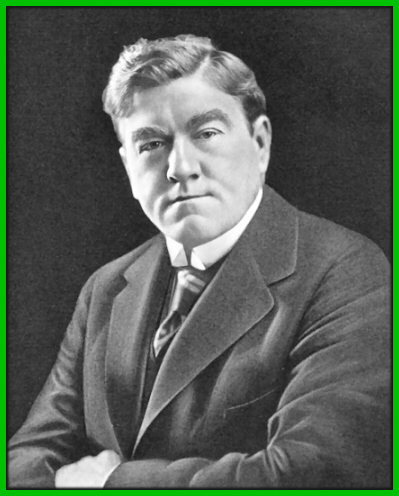

Joseph was born in Pittsburgh, Pennsylvania, on 18th July 1867; the son of Michael Joseph and Ellen (née Kirwan) Flannery. His father Michael was the son of Paul and Bridget (née Kildea) of Cartron townland in the civil parish of Killallaghtan, near Ballinasloe, County Galway, who were married on 23rd June 1811 in the RC parish of Cappataggle in the diocese of Clonfert. Joseph married Mollie Gearing of Pittsburgh on 9th April 1901, and had four children, Joseph M. Jr., Helen Kirwan, John Gearing, and Raymond Gerard.
Joseph was educated at Christian Brothers' Parochial School and Holy Ghost College, Duquesne University, Pittsburgh. His brother James J. Flannery founded an Undertaking business in 1874, and Joseph worked with him until 1904 when he sold his interest and bought the patent for a flexible stay bolt used in locomotive manufacure. He started the Flannery Bolt Company in Bridgeville to produce and market the stay bolts, and built up the business to efficiently capitalise on the heyday of rail transport.
In due course, his interest turned to vanadium and its use in the manufacture of high strength steel alloys. After travelling to Peru, he negotiated control of the Minas Ragra deposit, later recognised as the largest and richest source of vanadium in the world. He founded the American Vanadium Company and built a new plant in Bridgeville to research and produce vanadium alloy steel. The superior steel was used in the construction of the Panama Canal lock gates and Ford motorcars.
In 1909, Joseph was advised by medical specialists in Europe that his sister, diagnosed with cancer, might be treated by radium but its scarcity in Europe was a major problem. Accordingly, he withdrew from his vanadium interests and concentrated on establishing radium processing works in Pittsburgh. In 1911, the Standard Chemical Company was founded with Joseph as company president, and in 1913 the first radium was produced in U.S.A. The company mines in Colorado mined carnotite, a mineral containing vanadium, radium and uranium, thus efficiently serving several interests. Unfortunately, the successful commercial production of radium came too late to save his sister's life.
The use of uranium as an alloy for steel was a project that occupied the latter portion of Joseph's life. The project was interupted by the First World War - during which his steel works contributed to the national war effort - but he eventually proved the benefit of uranium alloy in the production of cutting tool steel. He also worked on improving the efficiency of gasoline production.
Joseph died on 18th February 1920 aged 52, and he is buried in Calvary Cemetery, Pittsburgh, Pennsylvania [Section M, Lot 120, Space 8].
[his portrait is illustrated above; courtesy of "History of Pittsburgh and Environs" (Fleming, 1922)]